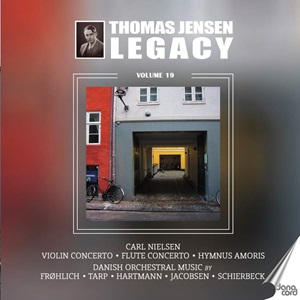
Thomas Jensen (conductor)
Legacy, Volume 19
Paol Birkelund (flute); Arne Karecki (violin)
Danish Radio Symphony Orchestra
rec. 1954-62, Tivoli Gardens, Copenhagen, studio and broadcasts
Danacord DACOCD 929 [2 CDs: 155]
There’s a feast of Nielsen in this two-for-the-price-of-one release and not just Nielsen either, as the second disc shows. Everything comes from broadcasts, with the single exception of the suite from Maskarade, which is the familiar 1954 Decca recording.
Nielsen wrote his Flute Concerto for Holger Gilbert-Jespersen, one of whose pupils was Poul Birkelund (1917-2006) and this 1958 broadcast comes direct from the Tivoli Gardens, Copenhagen. Birkelund was the Danish Radio Symphony’s principal and between 1938-43 he’d played in the Tivoli Orchestra, so there must have been a certain frisson for him in returning to the gardens. Jensen had recorded the work with its dedicatee, and his firm yet pliant guidance can be heard throughout, strongly rhythmic but full of expressive rubato when the music demands it. He and Birkelund are rather quicker in the opening movement than Gilbert-Jespersen, but are right on the button in the Allegretto, the flautist breezily and engagingly articulate throughout. The recorded sound is excellent, and you will enjoy this performance of the concerto, one that sits strongly in the dedicatee’s interpretative lineage.
Arne Karecki (1912-1998) became principal second violinist in the orchestra in 1955 and made some Mozart and Haydn chamber recordings in an ensemble that also contained Birkelund. It would be highly unusual, though not impossible, for a principal second to step up for a concerto engagement, so I’m wondering if he had become the concertmaster by 1962, the year of this broadcast. In any case he proves a committed interpreter of the Violin Concerto, clean-limbed, clear-toned and, it seems to me, predicated on the performance of Emil Telmányi, a great predecessor in this work; there are two Telmányi survivors, the studio recording with Tango and a live reading with Fritz Busch. Karecki is neat and stylish, a little small-scaled perhaps, and there are one or two places where he sounds a little taxed (the cadenza principally) but he shapes phrases sensitively and brings out all the wit in the scherzando. I’ll take Karecki over Menuhin in this work any day.
Saga-Drøm is a tone poem based on an Icelandic saga. Jensen brings out its full panoply of nobility and chorale richness, rising to a memorable pitch at the work’s mid-point before subsiding into the same feeling with which it began. The recording dates from 1961. The first disc ends with the 1896-97 cantata Hymnus Amoris, a twenty-minute festive piece, uneven in inspiration, but full of sturdy choruses and individual opportunities for six vocal soloists. If you know the work you may well have Mogens Wöldike’s recording and if one of the bass soloists weren’t quite so wayward I could recommend this Jensen too.
Disc two offers a more panoramic sweep of repertoire, from Hartmann to Tarp. It actually opens with Johannes Frederik Frøhlich’s Festmusik from his 1842 ballet about a Danish regicide and then continues with J. P. E. Hartmann’s Overture Yrsa, an even less jolly legend about incest (these Danes!). It’s of interest, tangentially perhaps, to scholars of Old English given that the incestuous product, Hrothulf, appears in Beowulf. It won’t surprise you to know that the music is terse and uneasy, the string writing sinewy and, with horns proliferating, incrementally dramatic. It’s a powerful eight minutes. The Decca extracts from Nielsen’s Maskarade include that emblematic Cockerel’s Dance (the Hanedans) and Jensen’s witty selection is heard in fine 1954 sound.
We now jump forward to Ejnar Jacobsen’s Symphony No 1 of 1945 subtitled ‘Now’. Jacobsen was well-known in Denmark for his school songbooks and for pedagogic work generally, though he’s not much remembered these days. The Symphony is certainly in Nielsen’s lineage in places – an inescapable shadow for many Danish composers – and, whilst tonal, capable of terse paragraphs; the second half of the first movement is, for instance, implacable. The central movement has mordant elements — horns and bassoon, swaying between aggression and more reflective panels, whilst the finale’s gruffness moves into a rather Shostakovich-like march theme.
The last two composers play on the Seasons. Tarp’s L’alternasi delle Stagioni , a witty antique look, does allow some graver Nielsenesque elements but ends in vernal warmth. Poul Schierbeck’s work is a cantata called Jylland (1947) and its conciliatory tone is less abrasive than Tarp’s. It’s also performed by a non-professional choir, the male voice Danish Radio Choir, which gives it a more homespun flavour. It ends with a celebratory Spring movement.
The sound quality all-round is excellent, and the booklet notes offer formidable documentary support. I see volume 20 is in preparation and contains Holmboe’s Seventh Symphony and Brene’s Viola Concerto. Keep them coming.
Jonathan Woolf
Help us financially by purchasing from


Contents
CD 1
Carl Nielsen (1865-1931)
Flute Concerto (1926)
Paol Birkelund (flute)
Live broadcast, May 1958, Tivoli Gardens, Copenhagen
Violin Concerto, Op 33 (1911)
Arne Karecki (violin)
Live broadcast, April 1962
Saga-Drøm, Op 39 (1907-08)
Live broadcast, January 1961
Hymnus Amoris, Op.12 (1896-97)
Ruth Guldbæk (soprano): Ellen Margrethe Edlers (mezzo-soprano): Niels Brincker and Niels Møller (tenors): Holger Nørgaard and Niels Juul Bondo (basses)/Danish Radio Children’s Choir and Danish Radio Choir
CD 2
Johannes Frederik Frøhlich (1806-1860)
Erik Menveds barndom: Festmusik (1842)
Live broadcast, January 1958
J. P. E. Hartmann (1805-1900)
Yrsa, Op 78: Overture (1881-82)
Live broadcast, January 1958
Carl Nielsen
Maskarade; excerpts: Overture, Magdelone’s Dancing Scene; Act 2, prelude: Hanewdans (Cockerel Dance): (1904-06)
Studio recordings, April 1954 for Decca
Ejnar Jacobsen (1897-1970)
Symphony No 1 ‘Now’ (1945)
Live broadcast, August 1960
Svend Erik Tarp (1908-1994)
L’alternasi delle Stagioni, Op 46 (1947)
Live broadcast, January 1958
Poul Schierbeck (1888-1949)
Jylland (1947)
Daanish Radio Choir (male voices)
Live broadcast, August 1961

















